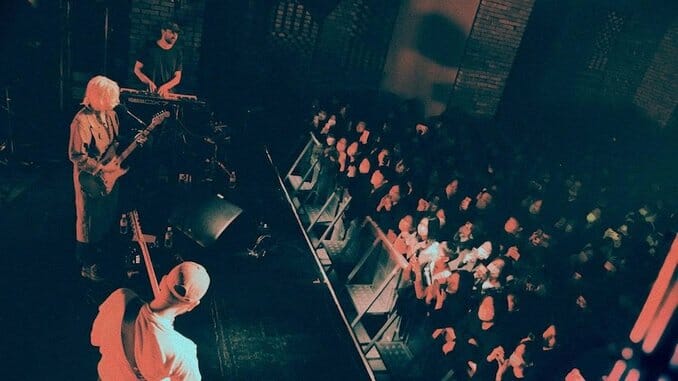How South Korea is Navigating Live Music During the Pandemic
Photo by Abi Raymaker
Before the coronavirus outbreak, on any given night in Seoul, South Korea, you could head to Hongdae to catch a show. Most of the city’s music venues are located there, with small, underground clubs on almost every corner, sometimes tightly packed or other times only sparsely filled, with music fans of all kinds. They buzz excitedly in groups after work ends on “burning Friday” (a less cheesy “TGIF”) or coolly sip drinks alone in the back. Beer is mixed with clear soju liquor for expediency. You can find artists like Kirara twisting knobs to dance bangers inspired by video games, Jambinai reimagining post-rock with traditional Korean instruments and punk band Drinking Boys and Girls Choir ripping through songs like “National Police Shit.”
But these days, in lieu of sticky floors and deafening sound systems, Korean indie fans tune in to YouTube on Tuesday and Thursday nights to watch live performances. Alone in their bedrooms or alongside a couple friends, they peer into their laptop screens. Sessions begin with an intro featuring homemade puppets—one resembling a mouse, another a human-shaped red blob and the third a person with wacky red hair—who bop around for a few minutes before delivering a brief uplifting monologue (their current spiel mourns the world’s rampant racism) and shouting the name of the show. The footage fades into a shot of a studio, and the magic begins. A Korean woman with curly green hair holds a pose in perfect stillness before her band erupts into a quirky pop song. Cameras show a close-up of her bejeweled synthesizer, a wide shot of the guitarist bouncing in place and chunky vintage TVs scattered around the set displaying the band’s logo.
This semi-weekly live stream, titled “Show Must Go On,” is broadcast live out of Senggi Studio in Seoul. Senggi is a music venue-studio hybrid that used to host concerts, music events and video shoots. Despite the pandemic, music venues in Seoul never faced strict regulations—until recently. All businesses continued to operate normally, citizens dutifully wore masks and Korea became a shining example of coronavirus preparedness in western news outlets. But a few weeks ago, the government’s newly designed four-tier system for coronavirus precautions was upgraded to level two-and-a-half, and Hongdae’s indie venues, even ones that could only host audiences of 20 people, were forced to shutter temporarily. Now, the “Show Must Go On” streamed shows are some of the only concerts in the entire city.
“When the coronavirus first started to spread, there weren’t many streaming performances being held,” explains the Senggi Studio “chang,” or boss and operator Jooyoung Jung. “Even now, most are filmed and edited in advance so artists and audience members can’t interact with one another. I wanted to create a streaming performance that felt more real, so I started ‘Show Must Go On.’”
His dream for the studio when it opened almost two years ago (anniversary celebrations were canceled this year) was to “introduce the best of Korean music to foreign countries, and introduce great music from abroad to Korean music lovers.” But now, his dreams have been forced to take a new form, as only 10 audience members are allowed at each concert and bringing in international artists is all but impossible.
These days, the information of live concert attendees, provided through individualized QR codes scanned at the door, must be collected in case of an outbreak. Jooyoung smiles as he squirts hand sanitizer into the hands of masked fans, who have come to see the idiosyncratic indie-pop diva Hyangni for tonight’s broadcast. Though times have never been tougher for venue owners and musicians alike, he’s determined to prove that music has no borders, and to promote underground music from Korea that most foreigners have never heard before.
Elsewhere in Seoul, Patrick Connor, manager of Korean indie-pop duo Wedance, hosted a socially distanced gig on Aug. 1. With a reduced audience of 200 people, the band went ahead with their previously planned album release party at a warehouse in the eastern part of the city.